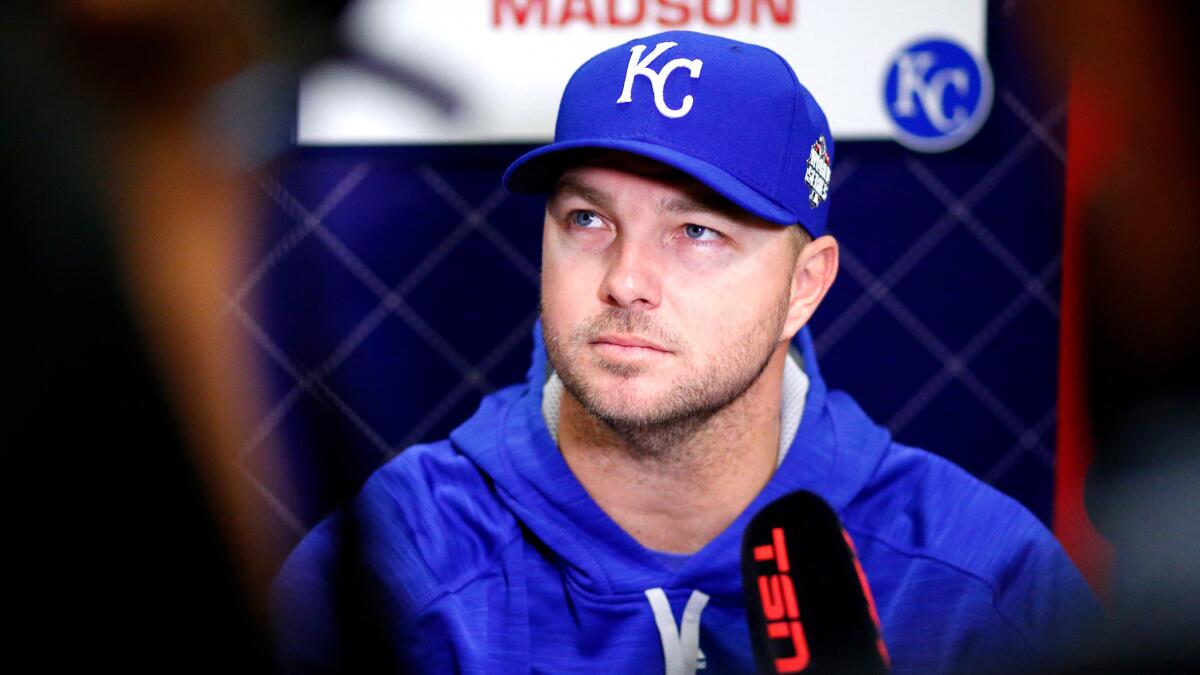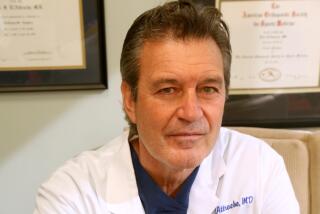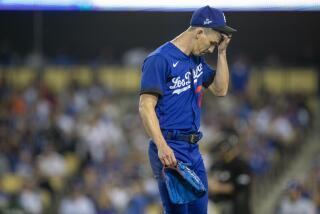Royals’ Ryan Madson gets some support for stance on HGH as treatment option

Ryan Madson talks to reporters before Game 1 of the World Series.
- Share via
Reporting from New York — — Ryan Madson does not mean to be provocative. He makes his living as a professional athlete, a World Series pitcher for the Kansas City Royals, with access to all the latest and greatest treatments designed to get him back on the field as soon as possible.
Almost all, that is. Madson would like to know why a baseball player cannot consider the use of human growth hormone.
Not to enhance his performance. Madson is absolutely clear about that.
However, after enduring three painful and frustrating years trying to coax his surgically repaired arm back into major-league shape, he wonders why HGH should not be available as a treatment option, under medical supervision.
“If you’ve gone through all the procedures and treatments that are available, and then a doctor could prescribe something that helps you get over something, then why not help professional athletes do it,” Madson said, “in a controlled manner, so they know exactly what is going in their body and how much is being used, for rehabilitation purposes only.”
He is not the only one wondering. Mark Cuban, owner of the NBA’s Dallas Mavericks, suggested two years ago that pro sports leagues fund studies to help determine whether HGH could aid in athletic rehabilitation. Cuban said this week he did it on his own.
“I funded a study with the University of Michigan,” Cuban said via email. “It will take another two years to know results.”
The Food and Drug Administration currently restricts the use of HGH in the United States to the treatment of a select few medical conditions, including hormonal deficiencies that inhibit growth and muscle-wasting diseases.
“Healing of injuries is not one of them,” said Dan Halem, baseball’s chief legal officer.
The commissioner’s office fought long and hard to get blood testing included in baseball’s drug policy. The blood tests are allowed solely to detect HGH. No player has received a medical waiver — the so-called “therapeutic use exemption” — for HGH. It is unknown whether any player has applied for an exemption to use HGH, since baseball’s drug policy requires disclosure of only those applications that are approved.
Halem said baseball generally takes its lead on drug policy matters from the U.S. Anti-Doping Agency. According to USADA chief executive Travis Tygart, the agency’s position on HGH is clear.
“It’s illegal, and it’s a potent performance-enhancer,” Tygart said. “We’re not in any position to push for it to be allowed in sport.”
He said HGH use could increase the risk of tumors, diabetes, heart trouble and carpal tunnel syndrome.
Neither legal nor medical risks have stopped athletes from trying HGH. Pitcher Andy Pettitte, whose number was retired by the New York Yankees this year, admitted to using HGH in his comeback from an elbow injury. After he retired, former Dodgers Cy Young award winner Eric Gagne acknowledged using HGH in his playing days.
After baseball’s crackdown, Yankees star Alex Rodriguez was cited for HGH use — among his violations of baseball’s drug policy — when he was suspended for the 2014 season.
Tygart could not dismiss the possibility that researchers might eventually uncover what he called “a line somewhere where recovery and rehabilitation meets advancement and performance,” a line that could enable doctors to distinguish between legitimate medical use and flagrant athletic cheating.
“Does it get you back to a normal level or give you a stronger arm or leg?” Tygart said.
He noted that USADA sponsored research that showed platelet-rich plasma (PRP) therapy was not a performance-enhancing treatment and should not be banned in sport. However, PRP therapy is not illegal and involves returning a person’s blood into his body, not putting a foreign substance into it.
Madson first spoke up on this subject two years ago, on the Angels’ website. The team had signed him to be its closer, one year after elbow surgery, and he had tried just about everything to get back that season, without success.
It took him three years to get back. He never did use HGH, he said. But he said many players have approached him to say they support his stance on HGH.
“Absolutely,” he said. “They’re not saying it as a first option, and not out of control. But there are all kinds of treatments out there — PRP, platelets, massage, acupuncture, dry needling, all kinds of medications.
“We’re doing a lot of stuff. Why not just add that last little bit — a small dose, or whatever is prescribed by a doctor? What’s wrong with that?”
Twitter: @BillShaikin
More to Read
Go beyond the scoreboard
Get the latest on L.A.'s teams in the daily Sports Report newsletter.
You may occasionally receive promotional content from the Los Angeles Times.











